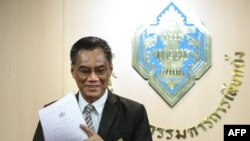Thailand’s Election Commission is weighing a last-minute legal challenge to the pro-democracy front-runner in the country’s race for prime minister in a case that could derail the political career of one of the military-backed government’s fiercest critics.
The complaint against Move Forward Party leader Pita Limjaroenrat bears strong echoes of the case that brought down another rising star of Thailand’s gaining pro-democracy movement four years ago and set the stage for a wave of anti-government protests.
In both cases “it’s the same legal provision,” said Jade Donavanik, president of the law faculty at Thailand’s College of Asian Scholars.
That provision bars candidates for public office from holding shares in a mass media company. Days before Sunday's vote to fill Thailand’s House of Representatives, a candidate for the ruling, pro-military Palang Pracharath party filed a case with the commission accusing Pita of holding shares in the inactive broadcaster iTV and of failing to disclose them among his assets.
Pita’s party had been surging in opinion polls heading into Sunday’s vote on a wave of mounting frustration with the government of Prayut Chan-o-cha, an ex-army chief who seized power in a 2014 coup. Move Forward vowed to end military conscription, slash the defense budget and curb royal defamation laws that were landing hundreds of government critics in court or jail. Come election day, it won 152 of the 500 House seats up for grabs, the most of any party.
Joint vote
And while Pita himself has topped opinion polls of whom the public wants for prime minister, the post will be filled, per Thai law, by an upcoming joint vote of the House and military-appointed Senate, which holds another 250 seats. Negotiations are ongoing among the parties that won seats in the House for a coalition that could win that vote.
A decision by the Election Commission against Pita, and a subsequent conviction by the Constitutional Court, would force him out of parliament and out of the running.
Move Forward declined VOA’s request for comment on the complaint, though Pita has previously denied wrongdoing. According to local media reports, he says he inherited the shares when his father died in 2006 and had tried but failed to find a buyer. He also denied failing to declare the shares.
Khemthong Tonsakulrungruang, a legal scholar at Thailand’s Chulalongkorn University, says the case seems to have little legal merit.
He says the fact that iTV has been off the air for years renders moot the law’s intended aim of denying candidates undue influence over public opinion, and that Pita’s holdings, less than 1% of the company’s total shares, fall well short of a controlling stake. Transferring inherited shares in a company going through a legal dispute, he added, as iTV still is, was also “almost impossible” in practice.
Still, Khemthong says the case does hold risk for Pita.
“In a normal circumstance I would say it’s low, but given Thailand’s context I would say moderate,” he said.
“Unfortunately, the [Constitutional] Court and the Election Commission have already lost their credibility so much in Thai society,” he added. “People [have] suspected for years, maybe over a decade, that the court has been compromised, has been politicized and become just a tool for the establishment faction to suppress the masses. And unfortunately, both the Election Commission and the Constitutional Court played into that narrative.”
Khemthong pointed to the case of former lawmaker and Future Forward Party leader Thanathorn Juangroongruangkit as a prime example.
Future Forward had come out of virtually nowhere to score a surprise third-place finish in Thailand’s 2019 elections. Like its successor, Move Forward, it was the loudest and sharpest voice in parliament demanding checks on the political sway of the country’s powerful military and monarchy. As the party’s charismatic young leader, Thanathorn was the beacon of a new generation of voters tired of the status quo.
That November, following a probe by the Election Commission, the Constitutional Court convicted Thanathorn of holding shares in a media company, V-Luck. Though Thanathorn claimed to have transferred the shares to his mother before registering as a candidate, the court said he had failed to offload them in time and stripped him of his seat in the House.
Protests grew
Public protests soon followed, and they swelled the next year as the court prosecuted, and ultimately dissolved, Future Forward itself over an illegal campaign loan, banning Thanathorn and other party leaders from politics for the next decade. It was the third pro-democracy party the court had dissolved in the past 12 years.
The complaint against Pita could potentially ensnare Move Forward as well. It asks the Election Commission to consider whether all the party’s candidates for Sunday’s poll were even eligible to run, given that Pita was the one who, as party leader, legally certified them.
Jade, of the College of Asian Scholars, said the broader case against Move Forward seems weak, and would hinge on whether Pita knew he was unqualified to endorse the candidates, which he added, seemed a stretch.
But he believes the case against Pita himself is more complicated. Pita does seem to be holding the shares in some capacity, Jade said, but whether he was holding them all nominally for his father’s heirs or some for himself could make a difference.
“No one can raise this issue if there is no fact and there is no reality that they really hold on to the shares. If someone raised this issue and the EC said, ‘I don’t care about it,’ then the EC would be under [suspicion] themselves, so they have to do it,” he said, meaning investigate the claims.
That the timing of the case could work in the government’s favor by knocking Pita out of the race for prime minister, Jade added, does not mean it has no merit.
“When the time comes, and when it’s an advantageous step for them, then they can do it. Yes, of course I would also say that it’s quite political, but it’s also legal. They use the legal provision at a time that is politically advantageous for them,” he said.
The Election Commission did not reply to VOA’s request for comment. According to local media, commission Chair Ittiporn Boonpracong told reporters Monday that the claims against Pita had been investigated. He did not say whether the commission had reached a decision, or whether the case would be sent on to the Constitutional Court.
Khemthong believes Move Forward’s election success actually could work in its favor.
If prosecuting Thanathorn and Future Forward while in opposition could set off more than a year of unrest that drew tens of thousands of angry protesters to the streets, he said, any ruling to block Pita or Move Forward while on the cusp of seizing power could do even more.
“The clash, the tension would be much worse. I think that factors ... in the court’s calculation,” he said. “After this election it becomes very clear that the party is hugely popular and to do anything to tamper with the party or its leader has consequence.”






